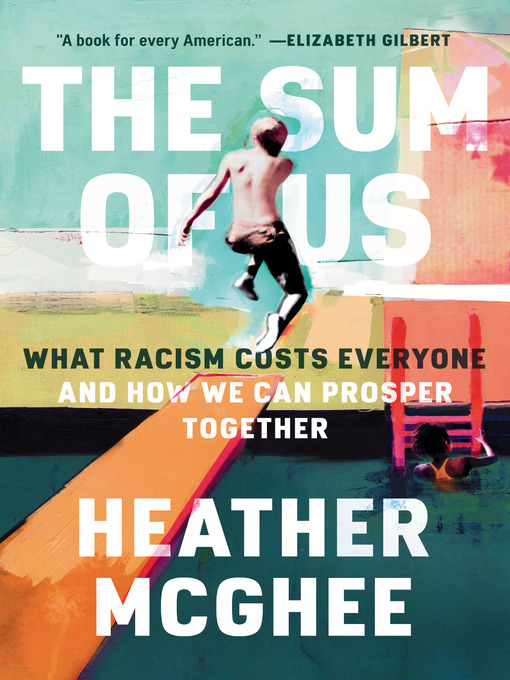
The Sum of Us
What Racism Costs Everyone and How We Can Prosper Together
- اطلاعات
- نقد و بررسی
- دیدگاه کاربران
نقد و بررسی

Starred review from January 4, 2021
Political commentator McGhee argues in her astute and persuasive debut that income inequality and the decline of the middle and working classes in America are a direct result of the country’s long history of racial injustice. Many white Americans, McGhee claims, center their political beliefs and actions—often to their own detriment—on the false premise that social and economic gains for one race result in losses for another. She traces the history of race relations in America from slavery through Reconstruction, Jim Crow, and the dawn of neoliberalism, documenting instances in which racism against Black Americans has diminished everyone’s quality of life and forestalled social progress, including the mass closure of public swimming pools in the 1950s and ’60s to avoid integration, and the American Medical Association’s “racist red-baiting campaign” to undermine President Truman’s efforts to pass universal health-care legislation. McGhee holds up a recent economic turnaround in Lewiston, Maine, as an example of how communities can thrive thanks to immigrants and people of color, driving home the point that racial inclusivity benefits all Americans. McGhee marshals a wealth of information into a cohesive narrative that ends on a hopeful note. This sharp, thorough, and engrossing report casts America’s racial divide in a new light.

January 15, 2021
A head-on consideration of the costs of American racism. Former Demos president McGhee undertook her first project for the organization by studying credit card debt--which, by the early 2000s, was far more likely to affect Black and Latinx families than White ones. When the subprime mortgage bubble burst, that problem became ever more urgent. However, as the author notes, Congress made it worse when it caved to the demands of the credit industry, after which "many of my fellow advocates walked away convinced that big money in politics was the reason we couldn't have nice things." One senator she overheard in the halls of the Capitol railed that the cause was the irresponsibility of minorities themselves, which set her on a diligent investigation of coded racism in the financial sector, which hinges on the zero-sum assumption that any gain for Blacks, say, would mean a concomitant loss for Whites. Not so. To this day, throughout the old Confederacy, the counties most dependent on slavery are the poorest today. "When slavery was abolished," writes McGhee, "Confederate states found themselves far behind northern states in the creation of the public infrastructure that supports economic mobility, and they continue to lag behind today. These deficits limit economic mobility for all residents, not just the descendants of enslaved people." Compassionate but also candid about the tremendous challenges we face, the author clearly shows how Southern racism extends throughout the country today. Those most opposed to unions, public education, and integration are mostly those at the top of the financial ladder; those lower down, of whatever ethnicity, wind up paying richly. In Chicago, McGhee estimates the cost of segregation is $4.4 billion in income and $8 billion in GDP. Restoring public goods is only a start in addressing those costs; the larger task, she writes provocatively, is getting Americans of all ethnicities to believe that "we need each other." An eye-opening, powerful argument for working ever harder for racial equity.
COPYRIGHT(2021) Kirkus Reviews, ALL RIGHTS RESERVED.

February 1, 2021
Why can't a wealthy, developed country like the U.S. achieve adequate healthcare, infrastructure, school funding, and wages above poverty? For her first book, McGhee, Trustee Emeritus on the Demos Board, traveled all over the country and had hundreds of conversations, revealing the answer: "zero sum" logic. This logic claims if one person or group advances, another loses; five dollars in my pocket equals five dollars out of yours. Poisonously pervasive in U.S policy, zero sum compels white citizens to relinquish benefits rather than see Black and Brown Americans gain. In one startling example of many, public pools, once considered community crown jewels, were closed rather than integrate. McGhee offers a mountain range of evidence that zero sum is a falsehood. While Black Americans are disproportionately affected, the majority of benefit receivers are white, meaning the majority of people losing denied benefits, like expanded Medicaid, are white. In actuality, the "solidarity dividend" proves that everyone's lives are improved when anyone advances. McGhee's book is required reading, a true work of courage and intellectual rigor. Readers have likely asked: Why is this so hard for a country that has so much? By unearthing and exposing the faulty why, McGhee illuminates the path to actual change.
COPYRIGHT(2021) Booklist, ALL RIGHTS RESERVED.

Starred review from March 1, 2021
In this highly anticipated debut, political commentator McGhee, board chair of Color of Change and former president of the inequality-focused think tank Demos, uses her economic and social policy expertise to argue that structural racism and white supremacy harm everyone, not only people of color. From California to Mississippi to Maine, the narrative follows McGhee as she interviews dozens of people working in low-wage industries across the United States. Her well-researched and well-documented reporting brings their experiences together in order to fully illuminate the detrimental societal costs of racism. Balancing these personal stories with an examination of the root causes of racial and social inequality in the country, McGhee shows that solutions are not and cannot be one-size-fits-all. And the author makes a convincing case that in finding common ground with each other and rejecting the zero-sum structures ingrained in American culture, we can move forward toward mutual understanding for the betterment of everyone. The inclusion of bibliographical references is an added bonus. VERDICT Essential reading for everyone working on incorporating more anti-racist thought leaders and perspectives into their collection.--Venessa Hughes, Denver
Copyright 2021 Library Journal, LLC Used with permission.




دیدگاه کاربران